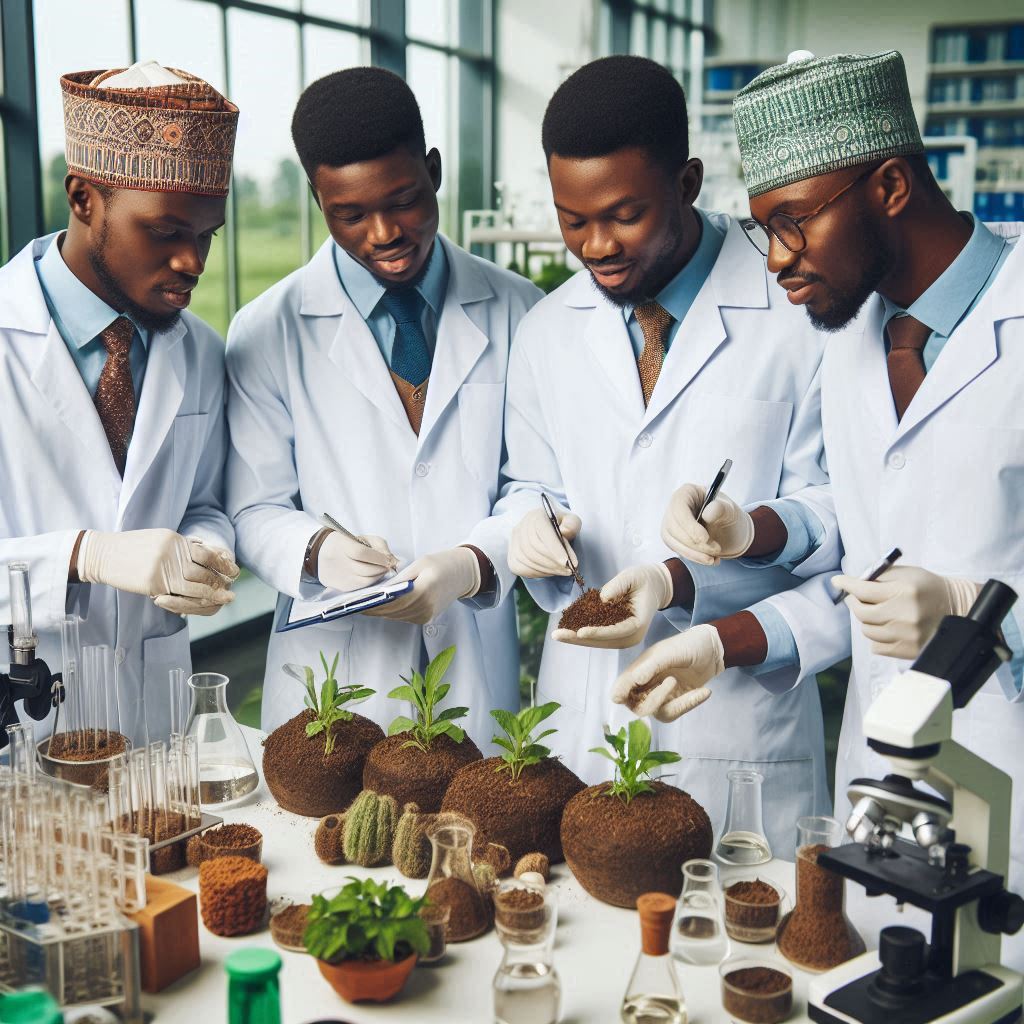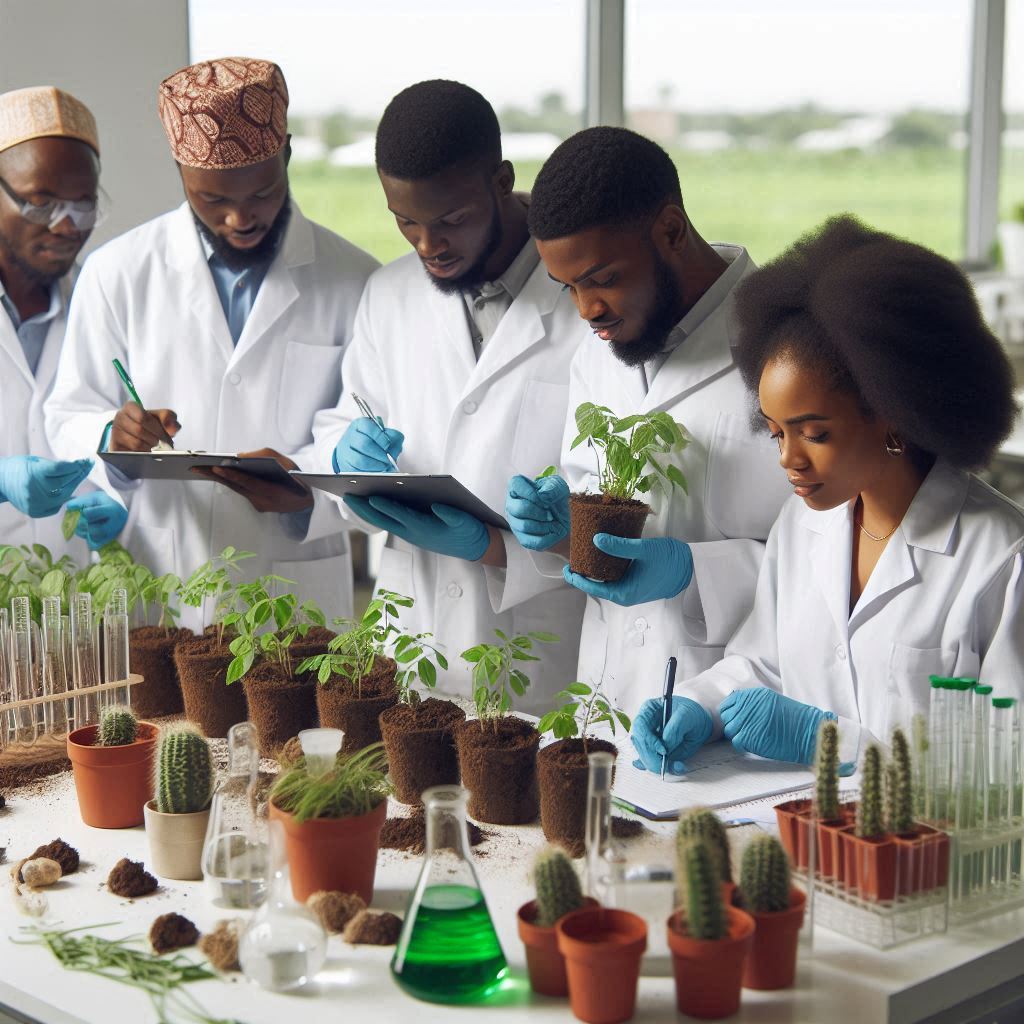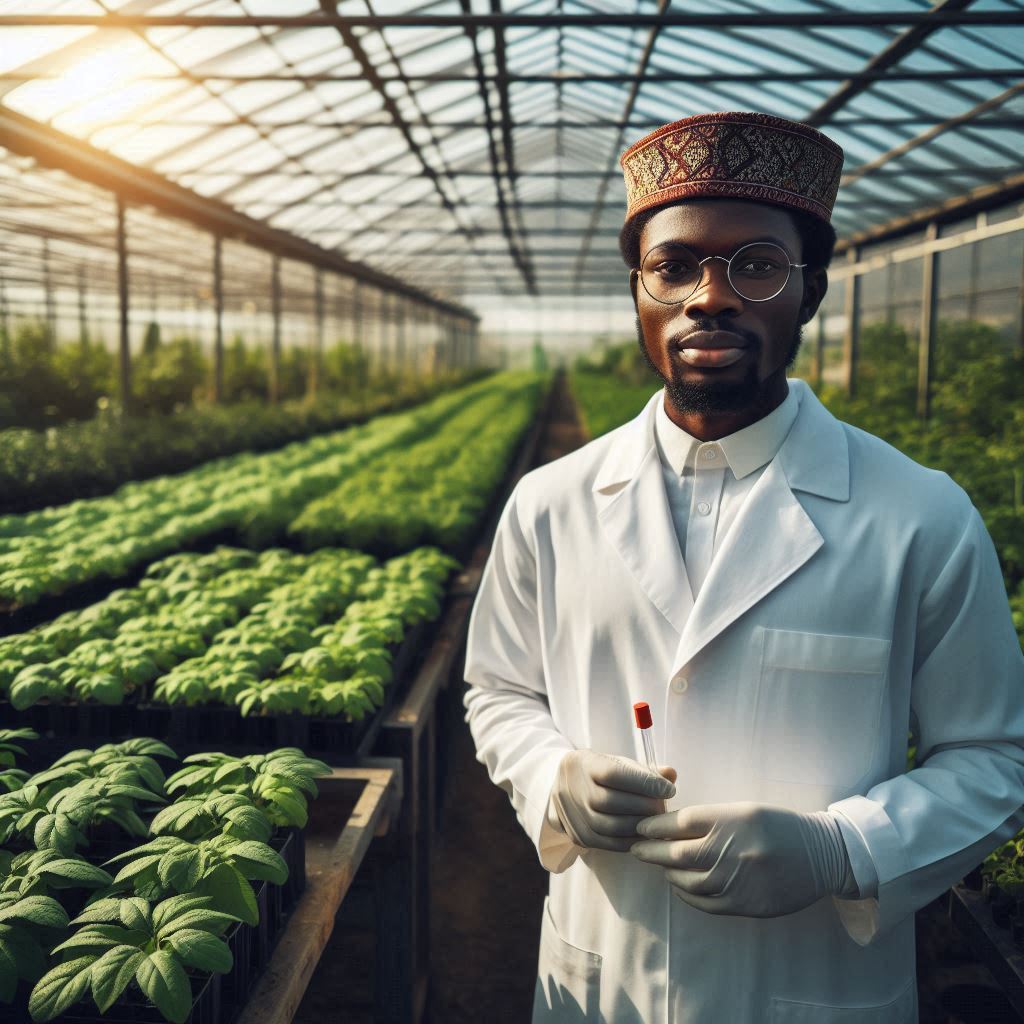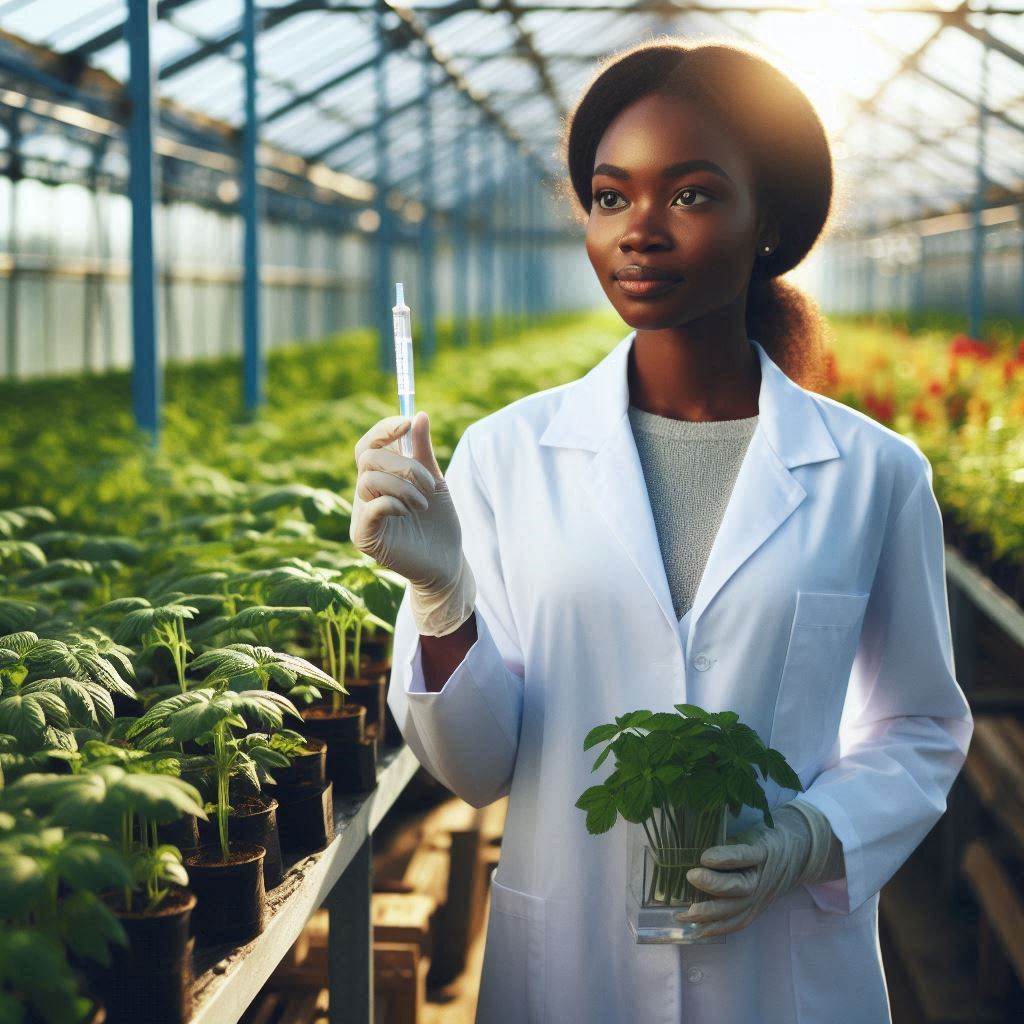Introduction
Women play a vital role in Nigerian agricultural science and education.
They actively participate in farming, research, and teaching.
Their involvement spans various sectors, from crop cultivation to agribusiness.
Highlighting women’s contributions is crucial for several reasons.
It recognizes their efforts and encourages more women to join the field.
Women’s participation leads to diverse perspectives and innovative solutions in agriculture.
They often bring unique insights into sustainable practices and community-based approaches.
Acknowledging their role also addresses gender disparities in agriculture.
It promotes equality and empowers women to take on leadership positions.
By showcasing successful women in agriculture, we inspire future generations.
Their stories can motivate young girls to pursue careers in agricultural science.
Overall, women’s contributions significantly impact Nigeria’s agricultural development.
Emphasizing their role ensures a more inclusive and progressive agricultural sector.
Recognizing and supporting women in agriculture is essential for Nigeria’s food security and economic growth.
Historical perspective
Women in Nigerian Agricultural Science and Education have made significant contributions over the years, despite facing various challenges and barriers.
Historical Perspective
- In the past, women in Nigeria were marginalized in the field of agricultural science and education.
- Traditional beliefs and cultural norms often restricted women’s access to education and career opportunities.
- Women were expected to focus on domestic responsibilities, leaving little room for pursuing careers in agriculture.
- Lack of awareness about the importance of women’s role in agriculture also hindered their participation in the field.
- Education was not easily accessible to women, limiting their knowledge and skills in agricultural science.
Challenges Faced by Women
- Limited access to education and training opportunities in agricultural science and related fields.
- Gender stereotypes and biases that undermined women’s capabilities and potential in agriculture.
- Cultural barriers that discouraged women from pursuing careers in male-dominated sectors like agriculture.
- Lack of infrastructure and resources to support women in agricultural research and education.
- Unequal opportunities for women compared to their male counterparts in terms of funding and grants.
Despite these challenges, women in Nigerian Agricultural Science and Education have shown resilience and determination to overcome obstacles.
Over the years, there have been efforts to empower women in agriculture through various initiatives and programs aimed at promoting gender equality and women’s participation in the field.
Emerging Trends and Progress
- Increased awareness about the importance of women in agricultural science and education.
- Implementation of policies and programs to support women’s involvement in agriculture.
- More women are pursuing careers in agriculture and making significant contributions to the sector.
- Collaborative efforts between government, NGOs, and stakeholders to empower women in agriculture.
- Recognition of women’s role in sustainable agriculture and food security.
Key Takeaways
- Women in Nigerian Agricultural Science and Education have faced historical challenges and barriers that limited their participation in the field.
- Efforts to empower women in agriculture have led to positive changes, with more women pursuing careers in the sector.
- It is crucial to continue supporting and empowering women in agriculture to ensure sustainable development and food security in Nigeria.
Essentially, women play a vital role in Nigerian Agricultural Science and Education, and their contributions are essential for the growth and development of the agricultural sector in the country.
It is important to address the challenges and barriers that women face, and to continue promoting gender equality and empowerment in agriculture for a more sustainable and inclusive future.
Read: Tech-Enhanced Learning in Nigerian Schools
Current Status
Statistics on the Current Representation of Women in Agricultural Science and Education in Nigeria
Women in Nigeria have made notable strides in agricultural science and education.
However, their representation still lags behind men.
According to recent statistics, women make up about 22% of the agricultural science workforce in Nigeria.
In educational institutions, women’s enrollment in agricultural courses stands at approximately 30%.
These figures indicate some progress, but there is room for improvement.
Any Progress or Advancements That Have Been Made in Recent Years
Several advancements have been made in recent years to enhance women’s participation.
Government initiatives and non-governmental organizations have launched programs targeting women’s inclusion.
For instance, the Federal Ministry of Agriculture and Rural Development has implemented policies to support women farmers.
These policies provide access to resources, training, and credit facilities.
Universities and colleges have also made efforts to increase women’s enrollment in agricultural science courses.
Scholarships and mentorship programs specifically for women have been introduced.
These initiatives aim to encourage more women to pursue careers in agricultural science.
Additionally, women’s agricultural associations have gained traction, providing support networks and advocacy for female farmers and scientists.
The International Institute of Tropical Agriculture (IITA) has played a significant role in promoting gender equality.
IITA’s programs focus on training women in sustainable agricultural practices and leadership skills.
These programs have empowered many women to take on prominent roles in the agricultural sector.
Moreover, women-led agricultural enterprises have seen growth, contributing to economic development and food security.
Community-based organizations have also contributed to advancements.
They offer training and resources tailored to women’s needs in rural areas.
By providing education on modern farming techniques and business management, these organizations help women increase their productivity and income.
As a result, more women are emerging as successful agripreneurs, leading to positive changes in their communities.
Read: Tech Tools for Nigerian Curriculum Developers
Role models and success stories
Success Story
Dr. Adesina’s success story is an inspiration to many women in Nigerian agricultural science and education. Her dedication and passion for improving agriculture in Nigeria have paved the way for other women to follow in her footsteps.
- Another notable figure is Prof. Grace Alele-Williams, the first female Vice-Chancellor of a Nigerian university.
- Prof. Alele-Williams is a mathematician and educator who made significant contributions to science education in Nigeria.
- Her leadership at the University of Benin set a precedent for women in academia and research in Nigeria.
Success Story
Prof. Alele-Williams’ success story exemplifies the resilience and determination of women in Nigerian agricultural science and education. Her groundbreaking achievements have inspired countless women to pursue careers in these fields.
- Dr. Modupe Adeoye: She is a pioneering researcher in the field of agricultural biotechnology in Nigeria.
- Dr. Adeoye’s work focuses on developing genetically modified crops that are resistant to pests and diseases.
- Her research has the potential to revolutionize farming practices in Nigeria and improve food security in the country.
Success Story
Dr. Adeoye’s innovative research in agricultural biotechnology serves as a shining example for women in Nigerian agricultural science and education.
Her dedication to solving agricultural challenges through science is truly commendable.
Read: Nigerian Curriculum Studies Academic Journals

Challenges faced by women
The Specific Challenges that Women Face in Pursuing Careers in Agricultural Science and Education
Women in Nigerian agricultural science and education encounter various challenges hindering their progress. Gender discrimination remains pervasive, limiting women’s opportunities.
Despite their qualifications, women often face biases and stereotypes in the workplace.
Address Issues Such as Gender Discrimination, Lack of Resources, and Societal Expectations
Additionally, women in agricultural science and education struggle with a lack of resources.
Limited access to funding, technology, and training inhibits their professional growth.
This lack of support stifles innovation and hampers productivity.
Societal expectations also pose significant obstacles for women in this field.
Traditional gender roles often dictate women’s responsibilities, prioritizing domestic duties over career aspirations.
As a result, women may face pressure to prioritize family obligations, limiting their time and energy for professional development.
Moreover, women in agricultural science and education confront challenges related to work-life balance.
Balancing demanding careers with family responsibilities can be daunting.
Women may struggle to juggle multiple roles, leading to stress and burnout.
Furthermore, women often encounter barriers to leadership positions.
Despite their qualifications and abilities, they may face systemic barriers to advancement.
Gender biases and stereotypes may prevent women from accessing leadership roles, perpetuating inequalities within the sector.
Addressing these challenges requires concerted efforts from all stakeholders.
Creating inclusive work environments and challenging gender stereotypes can help combat discrimination.
Providing equal access to resources, such as funding and technology, is essential for leveling the playing field.
Government policies and programs should prioritize supporting women in agricultural science and education.
Initiatives that provide scholarships, mentorship opportunities, and training programs can empower women to overcome barriers and excel in their careers.
Educational institutions must also play a role in addressing these challenges.
Implementing gender-sensitive policies and promoting diversity in leadership positions can foster a more inclusive environment.
Offering flexible work arrangements and support services can help women achieve better work-life balance.
Initiatives and support systems
Initiatives or Programs that are Working to Support Women in Nigerian Agricultural Science and Education
Several initiatives and programs are actively working to support women in Nigerian agricultural science.
These efforts aim to address the challenges women face and promote gender equality in the field.
The Federal Ministry of Agriculture and Rural Development has implemented various initiatives to support women farmers.
These include providing access to resources such as land, credit facilities, and training programs.
By empowering women with the necessary resources, these initiatives help them improve their agricultural practices and enhance their livelihoods.
Non-governmental organizations (NGOs) play a crucial role in supporting women in agricultural science and education.
Organizations like Women in Agriculture Development Foundation (WADEF) offer training, mentorship, and networking opportunities for women in the sector.
These programs help women build skills, access information, and develop professional networks, enabling them to thrive in their careers.
Universities and research institutions have also launched initiatives to support women in agricultural science and education.
Many institutions offer scholarships, fellowships, and research grants specifically for women pursuing degrees or conducting research in agriculture-related fields.
These initiatives aim to increase women’s representation in academia and promote gender diversity in research and innovation.
The International Institute of Tropical Agriculture (IITA) has been at the forefront of supporting women in agricultural science and education.
IITA’s Gender Research for Agricultural Development and Innovation (GRAID) program focuses on promoting gender-responsive research and innovation in agriculture.
The program provides training and technical support to researchers to integrate gender considerations into their work, ensuring that agricultural interventions are gender-sensitive and inclusive.
The Importance of Creating a Supportive Environment for Women in the Field
Creating a supportive environment for women in agricultural science and education is essential for advancing gender equality and maximizing the potential of the sector.
Women bring unique perspectives, skills, and experiences to the field, contributing to innovation and driving positive change.
By providing women with the support they need to succeed, we can harness their talents and expertise to address pressing agricultural challenges and achieve sustainable development goals.
Moreover, supporting women in agricultural science and education is not only a matter of gender equality but also economic development.
Women make up a significant portion of the agricultural workforce in Nigeria, and their contributions are vital for food security and economic growth.
By investing in women’s education, training, and empowerment, we can unlock the full potential of the agricultural sector and create opportunities for inclusive and sustainable development.
Generally, initiatives and support systems for women in Nigerian agricultural science and education are crucial for promoting gender equality and advancing the sector.
By providing women with the resources, opportunities, and support they need, we can empower them to succeed and drive positive change in agriculture and beyond.
Read: Implementing Tech in Nigerian Classrooms
Opportunities for growth
Women in Nigerian agricultural science and education have immense opportunities for growth and development.
By actively involving more women in this field, Nigeria can tap into a vast pool of talent and expertise that can drive innovation and progress.
Empowering Women
- Providing women with access to education and training in agricultural science can empower them to make meaningful contributions to the field.
- Empowering women in agricultural education can lead to more diverse perspectives and insights, ultimately benefiting the industry.
When women are given equal opportunities to participate in agricultural science and education, they can bring fresh ideas and approaches to the table.
Their unique experiences and viewpoints can help address challenges and improve the overall efficiency of agricultural practices in Nigeria.
Creating a Supportive Environment
- Creating a supportive environment for women in agricultural science and education can encourage more participation from women.
- Including women in leadership positions and decision-making processes can further empower them to drive positive change in the industry.
By promoting a culture of inclusivity and diversity, Nigeria can harness the full potential of its female workforce in the agricultural sector. This can lead to increased productivity, innovation, and sustainability in the long run.
Fostering Collaboration and Networking
- Encouraging collaboration and networking among women in agricultural science and education can lead to knowledge sharing and skills development.
- Establishing mentoring programs and networking events can provide women with valuable support and guidance to navigate their careers in the field.
By fostering a sense of community and camaraderie among women in agricultural science and education, Nigeria can create a supportive ecosystem that nurtures talent and fosters professional growth.
This can ultimately benefit the entire industry by promoting collaboration and innovation.
Investing in Women’s Development
- Investing in women’s education, training, and professional development in agricultural science is crucial for their advancement in the field.
- Providing financial support, scholarships, and resources for women pursuing careers in agriculture can help remove barriers to entry and facilitate their growth.
By committing resources and support to women in agricultural science and education, Nigeria can unlock the full potential of its female workforce and drive progress in the industry.
Investing in women’s development is not only beneficial for individual women but also for the overall growth and sustainability of the agricultural sector in Nigeria.
Overall, there are numerous opportunities for growth and advancement for women in Nigerian agricultural science and education.
By empowering women, creating a supportive environment, fostering collaboration and networking, and investing in women’s development, Nigeria can harness the full potential of its female workforce and drive progress in the agricultural industry.
It is essential to recognize the valuable contributions that women can make to the field and to actively promote gender equality and inclusivity in agricultural science and education.
Recommendations for Future Action
Ways to Further Empower and Support Women in Nigerian Agricultural Science and Education
To further empower and support women in Nigerian agricultural science and education, several actions can be taken.
Firstly, there is a need for increased investment in women’s education and training.
Providing scholarships, fellowships, and mentorship programs specifically for women in agricultural science can help enhance their skills and capabilities.
Secondly, creating more opportunities for women to access resources and technology is essential.
This includes ensuring equal access to land, credit facilities, and modern farming equipment.
Additionally, promoting the use of digital technologies and agricultural innovations can improve women’s productivity and efficiency in farming.
Thirdly, addressing gender biases and stereotypes in the agricultural sector is crucial.
Training programs and awareness campaigns can help change attitudes and promote gender equality.
Encouraging women to take on leadership roles and providing support for their career advancement can also help break down barriers.
Stakeholders to Prioritize Gender Equality and Diversity in the Industry
Furthermore, collaboration between government agencies, NGOs, academic institutions, and private sector organizations is necessary to implement comprehensive strategies for supporting women in agricultural science and education.
By working together, stakeholders can leverage their resources and expertise to create a more inclusive and supportive environment for women in the field.
Encouraging stakeholders to prioritize gender equality and diversity in the industry is essential.
This includes incorporating gender-sensitive policies and practices into agricultural programs and projects.
It also involves promoting women’s participation in decision-making processes and ensuring their voices are heard and valued.
Ultimately, empowering women in Nigerian agricultural science and education is not only a matter of social justice but also essential for the sustainable development of the sector.
By investing in women’s education, training, and empowerment, we can unlock their full potential and contribute to the growth and prosperity of the agricultural industry in Nigeria.
Most importantly, by implementing these recommendations and prioritizing gender equality and diversity, we can create a more inclusive and equitable agricultural sector that benefits women, men, and communities across Nigeria.
Together, we can build a brighter future for women in Nigerian agricultural science and education.
See Related Content: Importance of Cybersecurity Education in Nigeria
Conclusion
In the end, the pivotal role of women in Nigerian agricultural science and education cannot be overstated.
Throughout this discussion, we’ve highlighted the significant challenges women encounter, including pervasive gender discrimination, limited access to resources, and societal expectations that often prioritize traditional gender roles over career aspirations.
However, amidst these challenges, there are also promising initiatives and support systems aimed at empowering women in the agricultural sector.
From government programs to NGO-led initiatives and collaborations between various stakeholders, there’s a growing recognition of the importance of supporting women in agricultural science and education.
It is imperative to emphasize the importance of prioritizing gender equality and diversity within the industry.
By fostering an environment that is inclusive and supportive of women, we not only empower individual women but also drive innovation, productivity, and sustainable development within the agricultural sector.
In closing, recognizing and valuing the contributions of women in Nigerian agricultural science and education is not just a matter of equity, but it is also essential for the continued growth and prosperity of the agricultural sector as a whole.
Only by harnessing the full potential of women in agriculture can we truly achieve sustainable development and food security for all.




